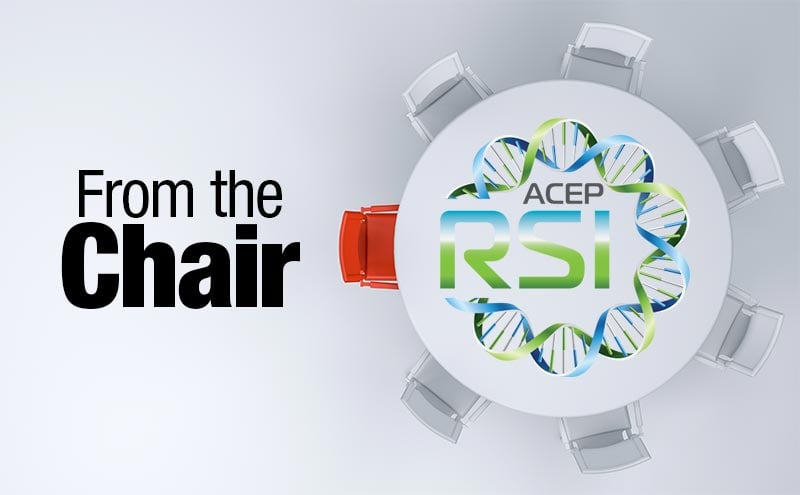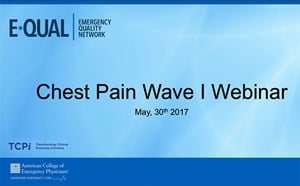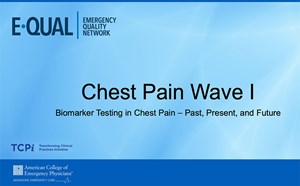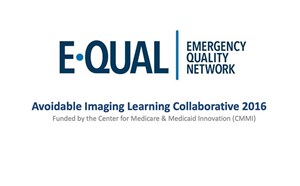
Message from the Chair
Dear RSI Section Members,
The last six months have been incredibly difficult for many people around the world. COVID-19 was recognized as a global pandemic and our country, the United States of America, has the highest number of diagnosed cases and deaths so far. We are also currently witnessing the consequences of structural racism and police brutality in our country. This has led to mass protests and led us to renewed discussions about the health equity that has been a mission of ACEP for many years. Our work as researchers is to identify these gaps and to provide evidence that can help create systemic changes to address these societal problems. George Floyd had an officer’s knee on his neck for almost nine minutes, which ultimately led to his demise and no medical attention was rendered. This did not happen for the first time and won’t be last until we decide as a society that we won’t let this happen again – and then act. Black lives really do matter and it is crucial that we, as healthcare providers, make all our patients feel at ease and confident that they are receiving equitable treatment, regardless of skin color.
Turning back to COVID-19, the pandemic has affected life of every single strata of US society and has affected every single aspect of healthcare operation. COVID-19 has indeed affected the disadvantaged disproportionately and there are cases where there have been multiple deaths in the same family. The emergency medicine community has faced it with strength and courage and brought every effort to the table to fight this deadly COVID-19 pandemic. A lot of decisions and management strategies were synthesized and tailored very quickly and efficiently to combat this disease. We are still not sure where we stand in terms of the overall course of the pandemic, but we hope that we have passed the first wave, and that the next waves have minimal to no mortality.
Different systems took different approaches to tackle the situation based on their patient load. In hotspots like New York, a lot of the elective space in hospitals for surgery and other ambulatory patient care was converted to either in-patient units or extended emergency department spaces to treat and assess patients. Quickly, but not quickly enough, testing was developed, and our scientists are now working towards developing treatments and vaccines and they are evaluating the role of antibody testing.
All of these decisions – whether to treat the disease, manage patient flow, or make public health decisions – stem from evidence … which comes from the science that we breathe and teach every day. I want to thank this community of scholars and researchers, who are always innovative, and who quickly redirected their resources and focus towards identifying a way to combat this pandemic. As we often say: “In science, what we don’t know, we just don’t know,” and there are many aspects of the COVID-19 disease process that we are still figuring out, and we will continue to learn. But we should not underestimate, nor underappreciate, the tremendous efforts made by our clinicians and researchers, as they translated theory into practice over a span of only two months.
That said, we also know that most research operations at most institutions have been either suspended or halted or have decelerated significantly. The extreme curiosity of those scientists provides us with the ability to solve such complex challenges, like COVID-19, which are dangerous to the human race. I want to thank you for your clinical, academic, and scholarly service, and I hope that all of you are staying safe, well, and looking out for each other.
The impact of this pandemic on physicians’ mental health is likely profound. People argue that emergency physicians are accustomed to seeing deaths on an everyday basis, but they are not, for example, used to seeing people die alone, unable to reach family. This would shake the core of any human being, and seeing it over and over again, sometimes more than ten times a day, it can do harm to any physician. On top of that, a lot of physicians have isolated themselves from their own family to protect their loved ones because they are worried that they might be a vector for the disease, which adds an increased amount of stress of being away from your own family and seeing an unprecedented amount of grief at work.
What this community is doing is above and beyond words … As chair of this Section, I want to invite you all to feel free to reach out to any of the Section officers, including me, at any time in case you just need someone to talk to. We are all in this together and we want everybody to be well.
I hope that this pandemic will end quickly and that we will be able to resume our normal lives soon. In the meantime, I am keeping everyone in my thoughts as I (and all the Section officers) acknowledge and admire the courage it takes to deal with COVID-19. I also convey my admiration for shared recognition of the importance of respectfully treating each and every emergency department patient when there is so much structural racism in our society.
Regards,
Nidhi Garg, MD, FACEP
RSI Section Chair
Director Emergency Medicine Research, Southside Hospital/ Northwell Health
Assistant Professor, Donald and Barbara Zucker School of Medicine at Hofstra/ Northwell




